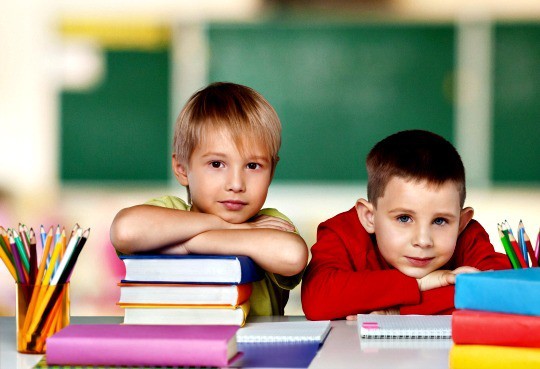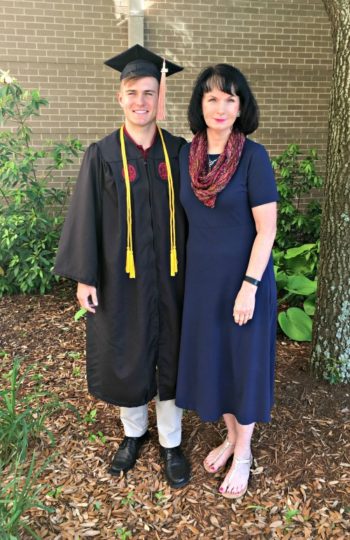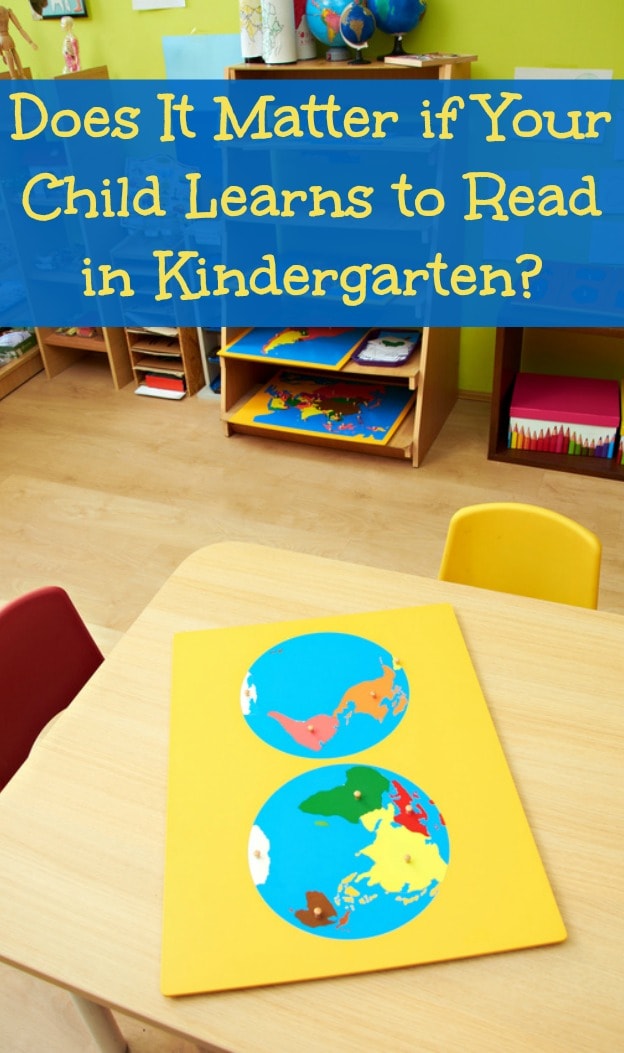 The year Sam started kindergarten, he turned 6 in October. He was one of the oldest children in his class, and he didn’t know how to read. When he started first grade he was almost 7, and he still didn’t know how to read.
The year Sam started kindergarten, he turned 6 in October. He was one of the oldest children in his class, and he didn’t know how to read. When he started first grade he was almost 7, and he still didn’t know how to read.
Fortunately for Sam, he entered first grade in 1999. And his teachers, Mrs. Gantt and Mrs. Floyd, didn’t panic about children who weren’t learning to read in kindergarten. In fact, they expected that most children would be learning to read in first grade. (They also supported and encouraged children who learned to read easily in kindergarten, like Sam’s brother, Ben.)
If Sam had started first grade this year, however, he probably would have been labeled as “slow” or “behind.” Because the new standard is that children should be learning to read in kindergarten. Even though most educators know that many children aren’t ready to learn to read until first grade. Even though countries like Finland educate kindergarteners by allowing them to play, not teaching them to academic skills.
And even though the new standard causes teachers, parents and even children themselves to worry that something is “wrong” if children aren’t reading when they arrive in the first grade classroom.
But guess what? Sam wasn’t “slow” or “behind,” and neither are most of the other children who aren’t learning to read in kindergarten. Sam became a fair reader by the end of first grade, and a good reader by third grade. By the time he reached high school he was an honors student. And last weekend, he graduated from college (in 4 years) – with a 3.93 grade point average.
So what happens when education standards require that children like Sam learn to read in kindergarten and that teachers like Mrs. Gantt and Mrs. Floyd had better make it happen? Many educators say the result is ineffective and counterproductive classroom practices. Which means that many children actually learn and retain less than they would in a developmentally-appropriate kindergarten classroom.
So here’s my advice. (You can take it with a grain of salt if you like, because I’m not a teacher. But I am Sam’s mom.) If your son or daughter isn’t learning to read in kindergarten, relax. Because many, many things are worse than not learning to read in kindergarten. Here are four of them:
• Limited time for creative play. Young children learn by playing. They learn by digging and dancing and building and knocking things down, not by filling out piles of worksheets. And they learn by interacting with other children, solving problems, sharing and cooperating, not by drilling phonics. Mrs. Gantt and Mrs. Floyd created fabulous centers and units that allowed children to learn about everything from houses to trucks to pets to oceans.
And they snuck in some reading and math skills that the children didn’t even notice, because they were so busy playing and creating! Teachers today,  however, often have to limit (or even eliminate) time for centers and units, because the academic requirements they are forced to meet don’t allow time for creative learning.
however, often have to limit (or even eliminate) time for centers and units, because the academic requirements they are forced to meet don’t allow time for creative learning.
• Limited physical activity. Few things are more counterproductive than limiting recess and other types of physical play time for children. Children learn better when they move. Parents and teachers know this intuitively, but research also confirms it. Children who have more opportunities to run around and play have better thinking skills and increased brain activity.
And don’t assume that young children are naturally active and are getting all of the exercise they need; researchers have found that children as young as three and four are surprisingly inactive. Yet many schools are limiting or even eliminating recess, even for very young children.
• Teaching that focuses on standards and testing. Teachers are increasingly under pressure to prepare their students to perform on standardized tests. This means that their focus is shifting from teaching children in ways that match their development and learning styles to “teaching to the test.”
As one teacher reported, “I have watched as my job requirements swung away from a focus on children, their individual learning styles, emotional needs, and their individual families, interests and strengths to a focus on testing, assessing and scoring young children…” This shift in focus means that teachers have less time to nurture and develop children as lifelong learners, because they’re required to focus their efforts on standards that are unrealistic for many children.
• Frustration and a sense of failure. Children know when they aren’t meeting the expectations of teachers and other adults. What they don’t know, however, is that those expectations often make no sense. And because they don’t know that, they experience frustration and a sense of failure when they don’t measure up.
So the boy who thrived in his experiential preschool, but struggles in his academic -focused kindergarten may become frustrated to the point that he “hates school.” And the girl who can’t sit still for 30 minutes and fill out worksheets knows that she’s disappointing her teacher, but doesn’t know that the task isn’t appropriate for her.
Which means that many normal children are becoming frustrated – and are being labelled – by an entirely unrealistic system. As one report has bluntly stated, “Most children are eager to meet high expectations, but their tools and skills as learners as well as their enthusiasm for learning suffer when the demands are inappropriate.”
If your child’s school is pushing academics in kindergarten in place of play-based learning, talk with the teacher. Chances are, she’s frustrated and under enormous pressure to get her students ready to “perform.” If you’re stuck with a kindergarten curriculum that seems unrealistic to you and doesn’t fit your child (and assuming that changing schools is not an option), let your child know that you’re not worried about reading in kindergarten (or even early in first grade).
Talk about people who learned to read later (like Sam!) and are doing just fine. Then do things that promote real learning, like reading out loud books he or she enjoys, playing games, teaching useful skills, and getting outside as often as possible to have fun, be active and learn together.
You may also like:
- Three Things You Must Do Before the School Year Begins
- How to Control Your Family’s Schedule – and Make it Work for You!
Also published on The Huffington Post.

haring with Family Fun Friday.
redheadmom8 says
Visiting from Family Fun Friday! What you’ve written here today is one of the many reasons we homeschool. As you said, children develop at different times and should not be forced to do soemthing they aren’t ready for. My son is going into third grade and is just beginning to sound out words. Am I worried? Not at all, because he is good at so many other things, like math, bike riding, and skateboarding. He is not even aware that he’d be labeled in school because homeschooling has allowed us to proceed with learning to meet each of our children’s indiviual needs.
GC says
Hi redheadmom8 – That’s a great reason for homeschooling, and it’s so wonderful that your son can learn at his own pace without being labelled in any way. I’m sad that many children are being labelled, when there is absolutely nothing wrong with them!
Thanks so much for stopping by.
Gaye
redheadmom8 says
Me too! Thanks for stopping by!
anne799 says
I taught preschool 20 years ago – and totally agree with you!
Many children are completely ready to read in kindergarten – a few are even in preschool – but not all. And there are many reasons for that. Simply being the youngest in the class puts a child at a disadvantage… a few months make a major difference at that age. And then there is normal variance in any ability in any age…
More often, the child is simply better at other skills – they’re kinesthetic learners, or shapes and math skills are coming more easily, or… Contrary to what many people think, it is not about intelligence… a child is not “smarter” just because she is more verbal, but a more verbal child will learn to read more easily.
And it is dangerous to teach a five year old that she is already a failure – and I’m afraid that some of these programs do…
Even when I was in the field, a great deal of the pressure towards formal academics was coming from parents, who did not understand that play *is* learning at that age (and for many years later!) and wanted to see their darlings sitting at desks and “learning something.” Teachers I know have been fighting back, but they need allies – decisions come from above. The more parents who understand what is going on, and why (and the reasons that it is a problem) the better.
GC says
Thanks so much, Anne. Yes, I am very concerned that many children are learning that they are “failures,” when in fact they are normal children. It really makes no sense.
Gaye
Cecilia says
Your informed and insightful essay should be read by every parent, policy maker, and voter. Elected officials are not qualified to legislate medical protocols, so they don’t. They are equally unqualified to legislate educational standards, but that has not stopped them from mandating school curriculum. The risk of harm is present in both instances. Parents should be encouragaged to support their children as they learn at their own pace, providing there is progress in skill development. We don’t expect all children to learn to cross the monkey bars on the same day, we don’t pressure them to do so, and still most kids learn to do both. Children will be more successful as learners and more likely to thrive emotionally if their right to be who they are is respected by those entrusted with their care. Congratulations to Sam, and to you, on his graduation!
GC says
Thank you so much, Cecilia. I agree with you completely. It certainly appears that people are making education policy who know very little about child development.
Gaye
Nicky at Little Family Adventure says
This is a great article Gaye. Congrats on Sam’s graduation. My oldest went to public school in kindergarten and brought home a ton of homework because he didn’t finish them in class. His half day program focused less on play and more on work. So after the year ended I pulled him out to homeschool him. I understand teachers’ frustrations with having to teach to the test. Here they, the teachers, are evaluated on the test scores of their students. I think it’s unfair for them and for the students. I love Finland’s model where children don’t learn to read until about age 7. They learn quickly and go on to much academic success. I wish we could realize that and change a broken system.
GC says
Thanks Nicky. The more I read about this and think about it, the angrier it makes me. So many normal children are being labelled in some way simply because they’re not reading at the end of kindergarten. It’s ridiculous. It causes so much stress for children and parents, and in many cases gives children the impression that something is wrong with them or that they don’t like school. I know that many teachers are frustrated too. I think you were really wise to pull your son out – what could be dumber than tons of homework for a child in kindergarten?!?!
Gaye